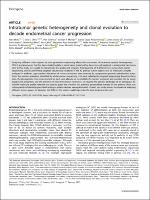| dc.contributor | Vall d'Hebron Barcelona Hospital Campus |
| dc.contributor.author | Mota Jimenez, Alba |
| dc.contributor.author | Oltra, Sara S |
| dc.contributor.author | Selenica, Pier |
| dc.contributor.author | Moiola, Cristian Pablo |
| dc.contributor.author | Casas-Arozamena, Carlos |
| dc.contributor.author | Lopez Gil, Carlos |
| dc.contributor.author | Rojo Sebastian, Alejandro |
| dc.contributor.author | Colas Ortega, Eva |
| dc.contributor.author | Gil Moreno, Antonio |
| dc.date.accessioned | 2022-08-19T09:33:44Z |
| dc.date.available | 2022-08-19T09:33:44Z |
| dc.date.issued | 2022-03-25 |
| dc.identifier.citation | Mota A, Oltra SS, Selenica P, Moiola CP, Casas-Arozamena C, López-Gil C, et al. Intratumor genetic heterogeneity and clonal evolution to decode endometrial cancer progression. Oncogene. 2022 Mar 25;41:1835–50. |
| dc.identifier.issn | 1476-5594 |
| dc.identifier.uri | https://hdl.handle.net/11351/8023 |
| dc.description | Endometrial cancer; Clonal evolution; Mutation |
| dc.description.abstract | Analyzing different tumor regions by next generation sequencing allows the assessment of intratumor genetic heterogeneity (ITGH), a phenomenon that has been studied widely in some tumor types but has been less well explored in endometrial carcinoma (EC). In this study, we sought to characterize the spatial and temporal heterogeneity of 9 different ECs using whole-exome sequencing, and by performing targeted sequencing validation of the 42 primary tumor regions and 30 metastatic samples analyzed. In addition, copy number alterations of serous carcinomas were assessed by comparative genomic hybridization arrays. From the somatic mutations, identified by whole-exome sequencing, 532 were validated by targeted sequencing. Based on these data, the phylogenetic tree reconstructed for each case allowed us to establish the tumors’ evolution and correlate this to tumor progression, prognosis, and the presence of recurrent disease. Moreover, we studied the genetic landscape of an ambiguous EC and the molecular profile obtained was used to guide the selection of a potential personalized therapy for this patient, which was subsequently validated by preclinical testing in patient-derived xenograft models. Overall, our study reveals the impact of analyzing different tumor regions to decipher the ITGH in ECs, which could help make the best treatment decision. |
| dc.language.iso | eng |
| dc.publisher | Springer Nature |
| dc.relation.ispartofseries | Oncogene;41 |
| dc.rights | Attribution 4.0 International |
| dc.rights.uri | http://creativecommons.org/licenses/by/4.0/ |
| dc.source | Scientia |
| dc.subject | Endometri - Càncer - Aspectes genètics |
| dc.subject.mesh | Endometrial Neoplasms |
| dc.subject.mesh | /genetics |
| dc.subject.mesh | Genetic Heterogeneity |
| dc.title | Intratumor genetic heterogeneity and clonal evolution to decode endometrial cancer progression |
| dc.type | info:eu-repo/semantics/article |
| dc.identifier.doi | 10.1038/s41388-022-02221-0 |
| dc.subject.decs | neoplasias endometriales |
| dc.subject.decs | /genética |
| dc.subject.decs | heterogeneidad genética |
| dc.relation.publishversion | https://doi.org/10.1038/s41388-022-02221-0 |
| dc.type.version | info:eu-repo/semantics/publishedVersion |
| dc.audience | Professionals |
| dc.contributor.organismes | Institut Català de la Salut |
| dc.contributor.authoraffiliation | [Mota A] MD Anderson International Foundation, Madrid, Spain. Biochemistry Department, Universidad Autónoma de Madrid (UAM), Instituto de Investigaciones Biomédicas ‘Alberto Sols’ (CSIC-UAM), IdiPaz, Madrid, Spain. [Oltra SS] MD Anderson International Foundation, Madrid, Spain. Biochemistry Department, Universidad Autónoma de Madrid (UAM), Instituto de Investigaciones Biomédicas ‘Alberto Sols’ (CSIC-UAM), IdiPaz, Madrid, Spain. Centro de Investigación Biomédica en Red de Cáncer (CIBERONC), Madrid, Spain. [Selenica P] Department of Pathology, Memorial Sloan Kettering Cancer Center, New York, USA. [Moiola CP, Colas E] Centro de Investigación Biomédica en Red de Cáncer (CIBERONC), Madrid, Spain. Grup de Recerca Biomèdica en Ginecologia, Vall d’Hebron Institut de Recerca (VHIR), Barcelona, Spain. Universitat Autònoma de Barcelona, Bellaterra, Spain. [Casas-Arozamena C] Translational Medical Oncology Group (Oncomet), Health Research Institute of Santiago de Compostela (IDIS), University Hospital of Santiago de Compostela (SERGAS), Santiago de Compostela, Spain. [López-Gil C] Grup de Recerca Biomèdica en Ginecologia, Vall d’Hebron Institut de Recerca (VHIR), Barcelona, Spain. Universitat Autònoma de Barcelona, Bellaterra, Spain. [Rojo-Sebastián A] Centro de Investigación Biomédica en Red de Cáncer (CIBERONC), Madrid, Spain. Grup de Recerca Biomèdica en Ginecologia, Vall d’Hebron Institut de Recerca (VHIR), Barcelona, Spain. Universitat Autònoma de Barcelona, Bellaterra, Spain. MD Anderson Cancer Center, Madrid, Spain. [Gil-Moreno A] Centro de Investigación Biomédica en Red de Cáncer (CIBERONC), Madrid, Spain. Grup de Recerca Biomèdica en Ginecologia, Vall d’Hebron Institut de Recerca (VHIR), Barcelona, Spain. Universitat Autònoma de Barcelona, Bellaterra, Spain. Servei de Ginecologia, Vall d’Hebron Hospital Universitari, Barcelona, Spain |
| dc.identifier.pmid | 35145232 |
| dc.identifier.wos | 000754012300003 |
| dc.rights.accessrights | info:eu-repo/semantics/openAccess |

